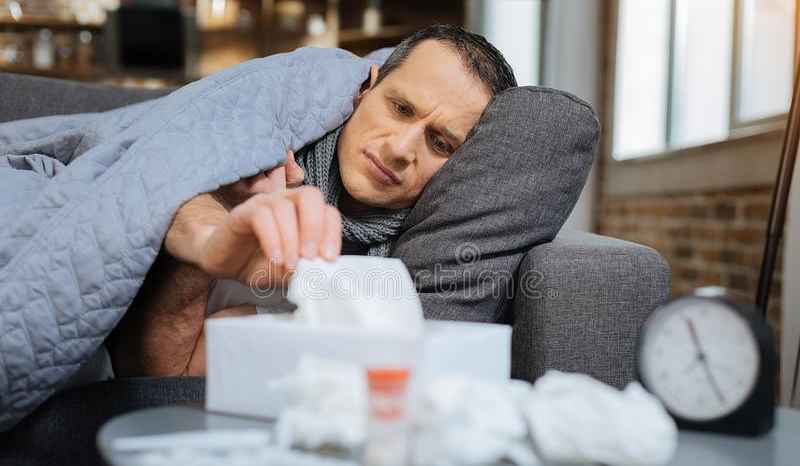





See listing of Recent and Most Popular articles on the Home Page
Health & Wellness
Category: Health & Wellness / Topics: Coping • COVID-19 • Crisis • Disease • News • Trends • Wellness
Don't Be Surprised When You Get Omicron
by Yasmin Tayag / The Atlantic
Posted: December 19, 2021
With the Omicron variant, America is in for a lot more breakthrough infections. Here’s what to do if you fall sick…
Editor's Note:My wife and I have followed COVID protocols since they were first introduced in March of 2020. Our community in the western suburbs of Chicago has been very compliant and patient, though suffering the same fatigue felt around the world. We also volunteer at the food pantry at our church, which changed protocols and has continued to serve without interruption.
We may be weary, but especially now we cannot be complacent.
In my last monthly report, COVID Perspectives for November 2021, the US was up to 1 in 7 people who have had confirmed cases of COVID. (By the end of the 1918 pandemic, 1 in 4 worldwide had been infected). So, the question looms, how long can we go without being infected, especially as the new Omicron variant seems to be producing many cases of breakthrough infections among the vaccinated?
Omicron may be milder and it be may less likely to require hospitalization, especially among the vaccinated, and death may be even less likely, but it raises new concerns. One young woman we know tested positive following a college sports trip. She expressed astonishment and frustration—after all, she was fully vaccinated and careful to follow all the protocols. So when I saw Yasmin Tayag's article from The Atlantic, it immediately resonated and I knew it had to be shared with you on SeniorLifestyle. Following is an excerpt, with a link to the full article at the bottom of the page.
My breakthrough infection started with a scratchy throat just a few days before Thanksgiving. Because I’m vaccinated, and had just tested negative for COVID-19 two days earlier, I initially brushed off the symptoms as merely a cold. Just to be sure, I got checked again a few days later. Positive. The result felt like a betrayal after 18 months of reporting on the pandemic. And as I walked home from the testing center, I realized that I had no clue what to do next.
I had so many questions: How would I isolate myself in a shared apartment? And why for 10 days, like the doctor at the testing site had advised? Should I get tested again? Following the doctor’s orders, my partner—who had tested negative—dragged a sleeping bag to the couch. Masks came on, windows went up, and flights were canceled. I ate flavorless dinners on my side of the apartment. One by one, the symptoms I knew so well on paper made their real-life debut: cough, fever, fatigue, and a loss of smell so severe, I couldn’t detect my dog’s habitually fishy breath.
. . . .
At least for now, Omicron shouldn’t change how Americans act when they get a breakthrough infection. “All of the same things stand, whether it’s Delta, Omicron, or any other Greek letter or non-Greek letter of SARS-CoV-2,” says Stephen Kissler, an epidemiologist at Harvard. “Once you know you’re infected, hang tight, limit your encounters with other people, and just take care of yourself.”
. . . .
If you start feeling anything that resembles COVID symptoms or learn that you’ve been exposed to someone who has tested positive, some experts told me, the first thing to do is to get tested. “If you’re not sure, you have to get tested,” Chin-Hong said. That’s especially true now that we’re heading into the winter, when all sorts of non-COVID illnesses are also circulating. It can be impossible to differentiate between the early symptoms of a cold, the flu, and COVID, and getting tested is the only way to confirm a breakthrough infection. The bottom line is that knowing whether you’re positive is important not just for you, but also for anyone who you’ve been in contact with recently—especially those who are unvaccinated or immunocompromised.
PCR tests are still considered to be the gold standard, but they take much longer to generate results than rapid tests, which you can buy at a pharmacy and take at home. A test is merely a snapshot in time, and because Omicron appears to have a shorter incubation period than past variants, a result from a few days ago may not mean much. More than 60 fully vaccinated people tested positive for Omicron after an office holiday party in Norway, and all had gotten negative rapid-test results just a day earlier.
[Rebecca Wurtz, an infectious-disease expert at the University of Minnesota] said that if you start to feel sick but haven’t been in contact with anyone and don’t plan to be, the best recourse is to stay home, minimize exposure to other people, and rest. “This may seem a little radical,” she said, “but I don’t think there’s a need in that context to be tested at all, period.” Again, the thing to consider is whether you’ve put anyone around you at risk of infection.
If you do test positive, you should alert your local public-health authority so they can initiate contact tracing, Chin-Hong said. Many testing sites do this automatically, but at-home tests, of course, do not. The CDC advises that after confirming your infection, you should start isolating right away, but unless you are asymptomatic, the first day of symptoms is technically what counts as the start of your 10 days of isolation. I learned the hard way that you aren’t supposed to “test out” of isolation, when a physician assistant yelled at me for getting tested after feeling better on day seven. She said I was putting others at risk, although the CDC guidance didn’t specifically say not to get tested. Explaining that I would have to isolate regardless of the outcome, she never told me my result.
. . . .
Thankfully, most breakthrough infections tend to be mild cases, and that seems likely to hold true with Omicron too (especially for those with booster shots). If you’re feeling unwell, the usual treatment for respiratory infections—cold-and-flu medications, anti-fever drugs, liquids, and rest—are sufficient for most people with breakthrough COVID, Wurtz said. Although monoclonal antibodies are effective at treating COVID, Chin-Hong said he offers them only to people who are older or immunocompromised, because they are the most vulnerable, even after getting vaccinated. (Soon, we’ll have yet another treatment option: antiviral pills.) Breakthrough infections are unlikely to lead to hospitalization for most people, but you should seek emergency care if you develop any severe symptoms, such as trouble breathing, persistent pain or pressure in the chest, or confusion.
. . . .
Thankfully, I’m fully recovered from my breakthrough infection, except for the ongoing inability to smell my dog’s breath. For now, what makes breakthroughs like mine so confusing is that the U.S. is in an “awkward transition phase,” Wurtz said, between following somewhat random rules—such as isolating for 10 days—and more deeply understanding what COVID-19 does to our bodies. I’ve since gotten a booster, and accepted that I’ll probably get sick with COVID again, maybe many times. COVID will someday turn endemic, and having it may become more like having a cold or a bout of flu: a normal, albeit exasperating, part of everyday life for most people (though not everyone). Eventually, even with Omicron, breakthroughs will become a lot less stressful. “I do think it is time to start normalizing breakthrough infections,” Wurtz added. “We have to learn to live with them.”
Read the full article
The Atlantic’s COVID-19 coverage is supported by grants from the Chan Zuckerberg Initiative and the Robert Wood Johnson Foundation.
Yasmin Tayag is a science editor and writer. She was previously the lead editor of the Medium Coronavirus Blog
Search all articles by Yasmin Tayag
Posted: December 19, 2021 Accessed 305 times
![]() Go to the list of most recent Health & Wellness Articles
Go to the list of most recent Health & Wellness Articles
![]() Search Health & Wellness (You can expand the search to the entire site)
Search Health & Wellness (You can expand the search to the entire site)
![]() Go to the list of Most Recent and Most Popular Articles across the site (Home Page)
Go to the list of Most Recent and Most Popular Articles across the site (Home Page)
 Loading requested view...
Loading requested view...